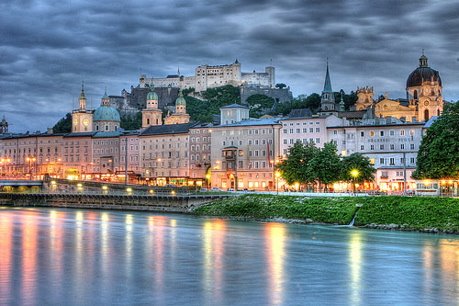 On Tuesday, I met the mother of one of Nikolas' classmates, Christopher, a six-year-old. Christopher who is very nice and talkative joined the Kindergarten this past November. Among all the things he told me after I'd met his mother was how much he loved Salzburg's Schloss or castle. Now technically, Salzburg has several castles and the building in the city center is NOT a castle, but instead a fortification, a "Festung." But come on, to a kid and to most adults, it's a bloody castle.
On Tuesday, I met the mother of one of Nikolas' classmates, Christopher, a six-year-old. Christopher who is very nice and talkative joined the Kindergarten this past November. Among all the things he told me after I'd met his mother was how much he loved Salzburg's Schloss or castle. Now technically, Salzburg has several castles and the building in the city center is NOT a castle, but instead a fortification, a "Festung." But come on, to a kid and to most adults, it's a bloody castle.One thing he shared with me that his mother probably didn't want him to dwell on was that "It's expensive to get into the castle." It is true that there's an entrance to the fortress grounds which offer great views. The actual inside of the fortress is interesting, too, but if you're able to walk around up there, it's as good as being inside. But what is also true, which I then shared with Christopher's mother, is that residents of Salzburg are allowed in for free! All you have to say is that you LIVE in Salzburg, and the man behind the counter hands you receipts that say you paid €0.00 to get in. She and her son were very happy to hear this as you might imagine.
 Conversely, there's Windsor Castle in Windsor, where, yes, the Queen lives. When we lived in England in the 1990s, we often went to Windsor but NEVER went into the Castle. It was just too expensive, although I don't remember what it cost at the time. Now we're here again, this time with Nikolas, who also likes castles (and what he calls "castle fighters), fortresses, etcetera, etcetera. But we won't be going to Windsor Castle. A "Family Pass" costs no less than €41 ($52). After researching several palaces and fortresses this year in thinking of places to take my students, I'm so used to seeing entrance prices in the range of €7 ($9) to think that it's a good idea to pay that kind of money. By comparison, the Festung's Family Pass is €17 ($21).
Conversely, there's Windsor Castle in Windsor, where, yes, the Queen lives. When we lived in England in the 1990s, we often went to Windsor but NEVER went into the Castle. It was just too expensive, although I don't remember what it cost at the time. Now we're here again, this time with Nikolas, who also likes castles (and what he calls "castle fighters), fortresses, etcetera, etcetera. But we won't be going to Windsor Castle. A "Family Pass" costs no less than €41 ($52). After researching several palaces and fortresses this year in thinking of places to take my students, I'm so used to seeing entrance prices in the range of €7 ($9) to think that it's a good idea to pay that kind of money. By comparison, the Festung's Family Pass is €17 ($21).We'll probably go to Windsor this week and, like in the 1990s, we'll probably see lines to get into the Castle, but we won't be among the masses. Sorry, Your Majesty, but I don't get it.






